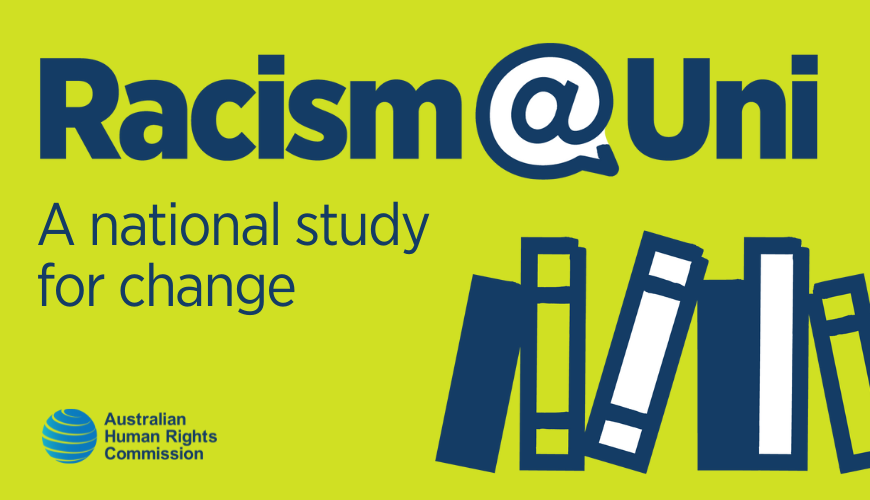Racism@Uni

Racism@Uni
The Australian Human Rights Commission is leading a landmark project to examine the prevalence, nature, and impact of racism in Australian universities. The Commission will then report on findings and make recommendations to the Australian government and universities to help make university environments safer places for everyone.
We want to understand how students and staff experience racism on campus or online at university. We encourage all staff and students to take part, especially staff and students from:
- Aboriginal and Torres Strait Islander communities
- Jewish communities
- Muslim communities
- Middle Eastern communities
- African communities
- South, Southeast, and East Asian communities
- Pasifika communities
- International student communities
If you haven't experienced racism yourself, but you have witnessed racism on campus, then we want to hear from you too.
Help us build a more inclusive future for everyone at Australian universities. Your participation is key to driving change to create university environments where students and staff feel safe and respected.
This project has been commissioned by the Commonwealth Department of Education.
How you can participate
Take the survey
- If your university is participating in the study, you will receive a survey link in your university email account. More details will be available in due course.
Stay informed and spread the word
- Encourage your classmates and colleagues to participate. The more voices we hear, the stronger our impact.
- Follow us on social media for updates and ways to get involved.
Why should you participate?
Your voice matters: By participating, you can share your experiences and help create a safer, more inclusive university environment for everyone.
Make change happen: Your input will help us make recommendations for change to the government and universities.
Together, we can make a difference.

Background
The Commission was tasked by the Australian Government in May last year to undertake this project, previously titled Respect At Uni and now called Racism@Uni.
After establishing a government working group and expert advisory committee, the Commission conducted initial consultations with relevant tertiary education organisations as well as organisations representing diverse cultural communities including people from First Nations, Jewish, Muslim and other negatively racialised communities.
The project’s next phase will involve current staff and students from universities across Australia participating in the study by taking part in a survey or joining a focus group.
The study comprises of four main parts:
National survey: The Commission has engaged The Centre for Social Policy Research (POLIS) at the Australian National University to conduct the national Racism@Uni survey. The survey will be sent by participating universities to all staff and students. The launch date for the survey is to be confirmed.
Focus groups: The Commission has engaged research consultancy Think Change Resolve, in collaboration with Langton & Partners, to conduct focus groups. These will take place nationally and are being developed using a co-design approach with targeted communities and relevant personnel from the university sector.
Literature review: The Commission has engaged Jumbunna Institute for Indigenous Education and Research, and the Centre for Social Justice and Inclusion, at The University of Technology Sydney to conduct a comprehensive literature review of domestic and international research on the prevalence, nature and impact of individual and systemic racism within universities.
Policy Audit: The Commission is reviewing policies related to racism across Australian universities and will showcase examples of good practice and make recommendations to strengthen policy.
Interim report findings
- An interim report for the project was delivered in December 2024 to update the Australian Government on the study's progress. Initial findings revealed that both interpersonal and structural racism are pervasive and deeply entrenched in Australian universities, and racism affects various communities differently, including Jewish, Muslim, Palestinian, and Middle Eastern students and staff. First Nations students and staff also reported profoundly negative impacts.
- Students shared that their experiences of racism make them feel unsafe and unwelcome, which adversely affects their engagement and performance at university.
- Staff reported feeling 'othered' and less confident in expressing their opinions or identity, with high levels of casual employment and a hierarchical academic structure exacerbating these issues.
- Low racial literacy – the ability to name, understand, and confront racism – was noted as a key obstacle to anti-racism efforts across universities.
- A final report containing relevant recommendations is scheduled to be delivered to the Australian Government in October 2025.
Some of the findings from initial consultations with various communities include:
First Nations students and staff: First Nations participants report enduring structural and interpersonal racism, including undermining of their achievements by characterising them as “special treatment” rather than merit based. Limited understanding of historical and systemic discrimination remains a barrier to equity.
Jewish students and staff: Jewish students and staff cite a rise in antisemitism since October 2023, including extremist propaganda, intimidation, and exclusion. Concerns over safety were compounded by insufficient university responses.
Palestinian, Arab, and Muslim students and staff: Participants described hostility, threats, and discriminatory practices, including restrictions on cultural expression and prayer spaces. Many feared academic repercussions for speaking out.
African and Asian students and staff: African students and staff frequently encountered severe racism, often feeling the need to moderate their natural ways of expressing themselves. Asian participants reported being stereotyped as high achieving but limited to specific academic disciplines.
International students: Reports of exclusion, social isolation, and fears of visa repercussions were common. Many felt reduced, viewed as "cash cows" for universities.
Rights on campus
The Racial Discrimination Act 1975 (Cth) protects people from unfair treatment, vilification, or harassment on the basis of their race, colour, descent, or national or ethnic origin. These protections also extend to people because of their migrant status. These rights are applied evenly in all sections of Australian society, including at our universities.
Students and staff have the right to feel safe on campus, and to flourish in an environment that has robust systems in place to maximise their chances to succeed.
Additional reading
- Download the Study Terms of Reference (PDF) 262KB or Study Terms of Reference (Word) 100KB
- Commission delivers interim report on racism at Australian universities
- Commission to lead historic anti-racism study into universities.
- Learn more about the Race Discrimination Commissioner's work.
